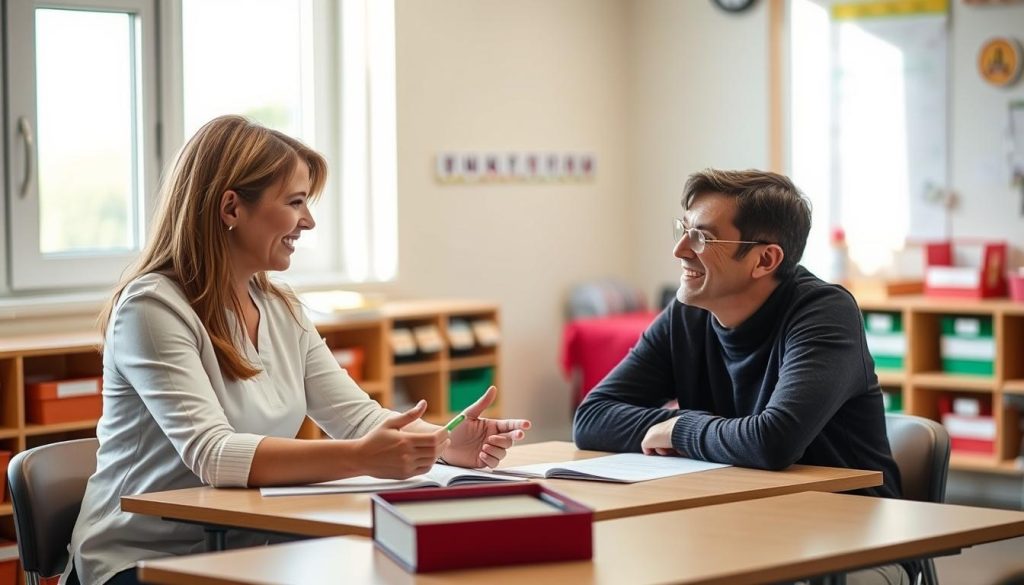Why Expert Communication Strategies Matter in Parent Relationships
Effective communication creates the foundation for strong parent-teacher partnerships
When it comes to student success, the research is clear: parent involvement significantly improves academic outcomes. According to a Harvard Family Research Project meta-analysis, students with engaged parents are more likely to earn higher grades, have better social skills, and show improved behavior regardless of socioeconomic background.
But parent involvement doesn’t happen by accident. It requires teachers to develop specific teacher skills that foster trust and open communication. When parents trust you, they’re more likely to support your classroom strategies, reinforce learning at home, and work collaboratively when challenges arise.
Expert communication strategies create the foundation for this trust. They help you navigate cultural differences, address concerns before they escalate, and demonstrate your commitment to their child’s success. These aren’t just nice-to-have teacher skills—they’re essential tools that directly impact your classroom effectiveness.
Consider these statistics:
86% of teachers report that lack of parent support is their biggest challenge, yet only 24% feel “very prepared” to engage effectively with families.
This disconnect highlights why intentional communication approaches matter so much. By mastering expert communication strategies, you position yourself as a professional who values partnership—something parents consistently rank as a top quality they seek in their child’s teacher.
The good news is that effective parent communication is a learnable skill. With practice and the right techniques, you can transform even the most challenging parent relationships into productive partnerships that benefit everyone—especially your students.
Expert Communication Strategies: The Power of Active Listening
Active listening might be the most underrated yet powerful teacher skill in your communication toolkit. When parents feel truly heard, the entire dynamic of your relationship changes. Active listening goes beyond simply hearing words—it’s about understanding the emotions, concerns, and perspectives behind what parents are saying.

Here’s how to practice active listening as part of your expert communication strategies:
Give Your Full Attention
When a parent is speaking, eliminate distractions. Put away your phone, close your laptop, and turn away from your computer screen. Make eye contact and use body language that shows you’re engaged. This communicates respect and helps establish trust from the beginning.
Use Verbal and Non-Verbal Cues
Simple acknowledgments like nodding, saying “I see” or “I understand” show parents you’re following their concerns. These small signals are powerful components of expert communication strategies that encourage parents to share more openly.
Reflect and Paraphrase
After a parent expresses a concern, paraphrase what you’ve heard: “So what I’m understanding is that you’re worried about Jason’s reading progress, especially with comprehension. Is that right?” This confirms you’ve understood correctly and gives them a chance to clarify if needed.
Ask Open-Ended Questions
Questions that can’t be answered with a simple “yes” or “no” encourage deeper conversation. For example, instead of asking “Is everything going well at home?” try “How has homework time been going at home?” This teacher skill invites more detailed responses.
Validate Emotions
Acknowledge the feelings behind parents’ words: “I can hear how concerned you are about this situation.” This doesn’t mean you necessarily agree with their perspective, but it shows respect for their emotions.
“The most basic of all human needs is the need to understand and be understood. The best way to understand people is to listen to them.” — Ralph Nichols
When you implement these active listening techniques, you’re not just collecting information—you’re building a foundation of trust. Parents who feel heard are more likely to be receptive to your ideas and suggestions later in the conversation.
Remember that active listening is a teacher skill that requires practice. It might feel awkward at first, especially when you’re busy or facing a challenging interaction. However, the investment pays off tremendously in stronger parent relationships and better outcomes for your students.
Enhance Your Parent Communication Skills
Looking to strengthen your active listening and other teacher skills? Explore professional development opportunities specifically designed for K12 educators.
Building Trust Through Clear and Consistent Communication
Clarity and consistency form the backbone of expert communication strategies with parents. When your messages are easy to understand and arrive reliably, parents develop confidence in you as a professional. Let’s explore how to implement these essential teacher skills in your daily practice.
Establish Communication Expectations Early
Begin the school year by clearly outlining how and when you’ll communicate with families. This proactive approach demonstrates organization and professionalism—key teacher skills that parents value. Consider creating a simple communication guide that answers:
- What is the best way to reach you? (Email, phone, app, etc.)
- What hours are you available to respond?
- How quickly can parents expect a response?
- What types of updates will you send regularly?
- How should parents communicate urgent matters?
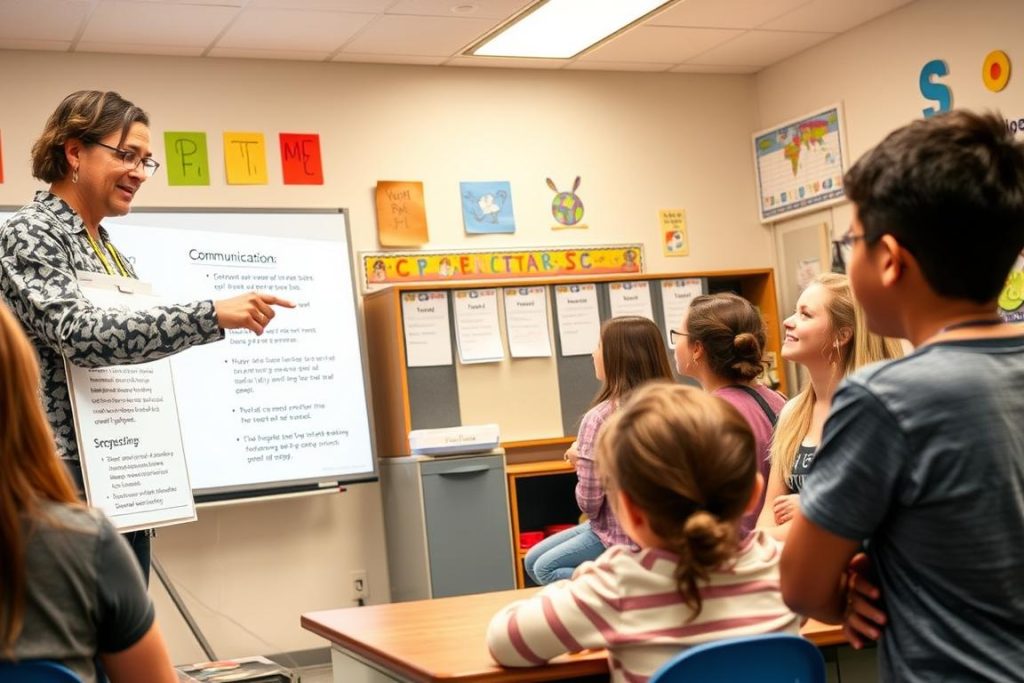
Use Simple, Jargon-Free Language
Educational terminology that seems obvious to you might be confusing to parents. As part of your expert communication strategies, translate educational concepts into everyday language. Instead of saying “formative assessment,” try “quick check-in quiz to see what concepts need more practice.” This clarity builds trust by making parents feel included rather than intimidated.
Maintain Regular Contact—Not Just During Problems
One of the most effective teacher skills is establishing regular positive communication. When parents only hear from you during challenges, they may develop anxiety about school communications. Consider:
Weekly Updates
A brief newsletter or digital update sharing classroom activities, upcoming topics, and celebrations
Positive Notes
Quick messages highlighting specific student strengths or improvements
Class Showcases
Digital portfolios or physical displays of student work with specific feedback
Check-in Calls
Brief, scheduled phone conversations to share progress and address minor concerns early
Be Transparent About Challenges
When difficulties arise, address them promptly and honestly. Parents appreciate straightforward communication about challenges when it’s delivered with empathy and accompanied by a plan. This approach demonstrates crucial teacher skills like problem-solving and professionalism.
For example, instead of simply reporting that a student is struggling with math, try: “I’ve noticed Alex is having difficulty with fraction concepts. Here’s what I’m doing in class to support him, and here are some activities you might try at home if you’re interested.”
Follow Through on Commitments
If you promise to send resources, check on a concern, or follow up by a certain date, make it a priority. Following through builds credibility and shows parents they can rely on you. This reliability is one of the expert communication strategies that creates lasting trust.
Pro Tip: Use a dedicated tracking system for parent communication follow-ups. A simple spreadsheet or digital task list can help ensure nothing falls through the cracks, especially during busy times of the year.
By implementing these strategies for clear and consistent communication, you demonstrate key teacher skills that parents value. The investment in thoughtful communication pays dividends in stronger relationships and better support for your students.
Expert Communication Strategies for Navigating Difficult Conversations
Even the most skilled teachers encounter challenging conversations with parents. Whether discussing behavioral issues, academic struggles, or disagreements about classroom approaches, these interactions test your teacher skills and emotional resilience. The expert communication strategies below can help you navigate these situations effectively.
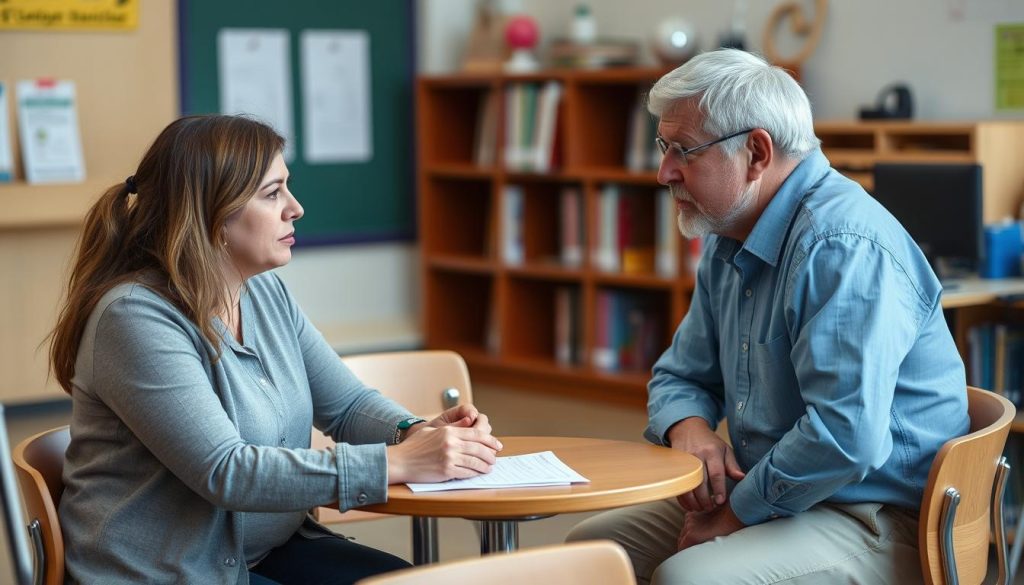
Prepare Thoroughly
Before difficult conversations, gather specific examples, data, and observations. Being prepared demonstrates professionalism and helps keep the discussion focused on facts rather than emotions. This preparation is a fundamental teacher skill that builds credibility.
Consider creating a brief outline with:
- Specific observations (with dates when possible)
- Relevant student work samples
- Notes on interventions you’ve already tried
- Questions to understand the parent’s perspective
- Potential solutions to propose
Use “I” Statements
Frame your concerns using “I” statements rather than statements that might sound accusatory. This approach is one of the expert communication strategies that helps maintain a collaborative tone.
Instead of: “Jordan is constantly disruptive and doesn’t follow directions.”
Try: “I’ve noticed that Jordan has difficulty staying focused during group work. I’m concerned because this affects his ability to complete activities.”
Acknowledge Emotions While Staying Professional
Difficult conversations often involve strong emotions. Acknowledging feelings—both the parent’s and your own—is an important teacher skill that creates space for productive dialogue.
You might say: “I understand this is frustrating to hear. I share your concern about Maya’s progress, and that’s why I wanted to talk with you directly about some strategies we can try together.”
Focus on Partnership and Solutions
Frame the conversation around working together for the student’s benefit. This collaborative approach is one of the most effective expert communication strategies for diffusing tension.
Use phrases like:
- “How can we work together to support…”
- “What strategies have you found effective at home?”
- “I’d like to propose a plan that combines school and home support…”
Know When to Pause and Reschedule
If a conversation becomes too emotional or unproductive, it’s a valuable teacher skill to recognize when to take a break. You might say: “I think we both want what’s best for Alex. Since this is an important discussion, would it be helpful to take some time to think and continue our conversation tomorrow?”
“The single biggest problem in communication is the illusion that it has taken place.” — George Bernard Shaw
Document Key Points and Next Steps
After difficult conversations, send a brief, factual summary of what was discussed and any agreed-upon actions. This documentation is an expert communication strategy that prevents misunderstandings and demonstrates your commitment to follow-through.
These approaches help transform potentially adversarial interactions into productive problem-solving sessions. By implementing these expert communication strategies, you demonstrate essential teacher skills that build trust even during challenging situations.
Master Difficult Conversations with Parents
Develop advanced teacher skills for navigating challenging parent interactions with our specialized professional development course.
Culturally Responsive Expert Communication Strategies
Today’s classrooms serve increasingly diverse student populations, making cultural awareness an essential teacher skill. Effective communication with families from varied cultural backgrounds requires intentional approaches that demonstrate respect and build trust across differences.

Recognize Cultural Influences on Communication
Cultural backgrounds significantly influence communication preferences and expectations. As part of your expert communication strategies, consider how culture might affect:
- Comfort with direct versus indirect communication
- Expectations about parent involvement in education
- Views on appropriate topics for discussion
- Perceptions of authority and the teacher’s role
- Non-verbal communication norms like eye contact and personal space
Understanding these differences helps you avoid misinterpreting parent behaviors or unintentionally causing discomfort. This cultural awareness is a sophisticated teacher skill that demonstrates your commitment to inclusive communication.
Address Language Barriers Proactively
For families with limited English proficiency, language barriers can significantly impact communication. Implementing these expert communication strategies shows respect for linguistic diversity:
Provide Translated Materials
Work with your school to provide key communications in families’ home languages whenever possible
Use Visual Supports
Incorporate visuals, demonstrations, and examples to clarify meaning beyond words
Arrange Interpreters
Request professional interpreters for conferences and important meetings (avoid using students as translators)
Learn Key Phrases
Make an effort to learn basic greetings and phrases in families’ home languages
Demonstrate Cultural Humility
Cultural humility—the willingness to learn about and respect cultural differences without making assumptions—is a valuable teacher skill. This approach involves:
- Asking questions rather than making assumptions about cultural practices
- Inviting families to share their perspectives and expertise
- Acknowledging when you’re unfamiliar with a cultural practice
- Being willing to adapt your communication approach based on feedback
Research Note: According to a study from Colorín Colorado, when teachers make efforts to communicate in culturally responsive ways, parent involvement increases by up to 50% among culturally diverse families.
Create Multiple Engagement Opportunities
Different cultures have varying comfort levels with traditional school involvement. Expanding your engagement options is an expert communication strategy that welcomes diverse participation:
- Offer flexible scheduling for conferences and meetings
- Create opportunities for families to share cultural knowledge and experiences
- Provide various communication channels (digital, written, in-person)
- Consider home visits or community-based meetings when appropriate
By implementing these culturally responsive expert communication strategies, you demonstrate sophisticated teacher skills that create inclusive, welcoming environments for all families. This cultural responsiveness builds trust across differences and ensures all parents can effectively partner in their child’s education.
Digital Expert Communication Strategies for Today’s Parents
In our increasingly connected world, digital communication has become an essential channel for parent engagement. Mastering digital teacher skills allows you to meet parents where they are while maintaining professional boundaries and clear messaging.
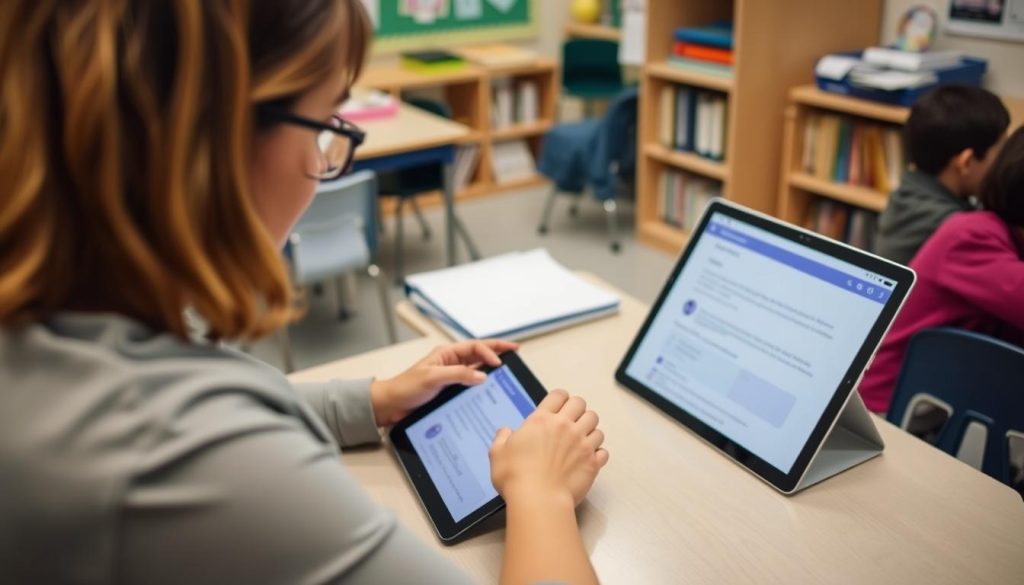
Choose the Right Digital Tools
With numerous digital communication options available, selecting the right tools is an important teacher skill. Consider these factors when evaluating platforms:
- Accessibility for all families (including those with limited technology)
- Translation capabilities for multilingual families
- Privacy and security features
- Ease of use for both teachers and parents
- Integration with your existing systems
Popular options include classroom apps like ClassDojo or Seesaw, learning management systems, email newsletters, and school-approved messaging platforms. Many teachers find that a combination of tools works best to meet diverse family needs.
Establish Digital Communication Guidelines
Clear expectations about digital communication are essential expert communication strategies that protect your time while ensuring parents feel heard. Consider creating guidelines that address:
Response Timeframes
Set realistic expectations for how quickly parents can expect responses (e.g., within 24 hours on school days)
Appropriate Hours
Specify your “office hours” for digital communication to maintain work-life boundaries
Channel Purpose
Clarify which types of communication belong on which platforms (e.g., quick updates via app, concerns via email)
Urgent Matters
Provide clear guidance on how parents should communicate time-sensitive information
Craft Effective Digital Messages
Writing clear, professional digital communications is a critical teacher skill in today’s educational landscape. Follow these expert communication strategies for digital messages:
- Use descriptive subject lines that help parents prioritize messages
- Start with the most important information (many readers skim digital content)
- Break content into scannable sections with headers or bullet points
- Maintain a positive, solution-focused tone even when addressing challenges
- Proofread carefully—digital messages create lasting impressions
Digital Communication Tip: When addressing sensitive topics, draft your message and then review it from the parent’s perspective before sending. Consider whether anything could be misinterpreted without the benefit of tone and facial expressions.
Balance Digital and Personal Communication
While digital tools offer convenience, they shouldn’t replace personal connection. Balancing digital and in-person communication is an expert strategy that builds stronger relationships.
Consider reserving digital channels for:
- Routine updates and reminders
- Sharing student successes and classroom activities
- Initial outreach on minor concerns
- Scheduling in-person conversations
Meanwhile, prioritize phone calls or face-to-face meetings for:
- Discussing significant academic or behavioral concerns
- Addressing sensitive family situations
- Resolving misunderstandings or conflicts
- Building relationships with families who seem disconnected
By thoughtfully implementing these digital expert communication strategies, you demonstrate essential teacher skills for the modern classroom. These approaches help you leverage technology’s convenience while maintaining the personal connection that builds lasting trust with families.
Enhance Your Digital Communication Skills
Looking for more strategies to effectively communicate with parents in the digital age? Our professional development resources can help you master these essential teacher skills.
The Hidden Power of Nonverbal Communication
While we often focus on what we say to parents, how we say it can be equally important. Nonverbal communication—including body language, facial expressions, tone of voice, and even physical environment—significantly impacts how parents perceive your messages. Mastering these nonverbal teacher skills enhances your expert communication strategies.

Body Language That Builds Trust
Your physical presence communicates powerful messages about your attentiveness and openness. These body language elements are essential teacher skills for effective parent interactions:
Eye Contact
Maintain appropriate eye contact to demonstrate engagement (while respecting cultural differences where direct eye contact may be considered disrespectful)
Open Posture
Keep arms uncrossed and body oriented toward the parent to signal receptiveness
Attentive Positioning
Sit or stand at the same level as parents rather than behind a desk to create partnership
Engaged Gestures
Use natural hand movements to emphasize points and show animation
Facial Expressions and Micro-Expressions
Your face communicates volumes about your attitudes and emotions. Being mindful of facial expressions is an expert communication strategy that prevents unintended messages:
- Practice a warm, attentive expression that communicates interest
- Be aware of unintentional reactions like raised eyebrows or frowns
- Match your expression to the conversation’s tone while maintaining professionalism
- Use appropriate smiling to create warmth without seeming dismissive during serious topics
“The most important thing in communication is hearing what isn’t said.” — Peter Drucker
Voice Tone and Pacing
How you speak conveys as much meaning as your words themselves. These vocal elements are important teacher skills that influence how parents receive your message:
- Speak at a moderate pace that allows for processing, especially when discussing complex topics
- Vary your tone to maintain engagement and emphasize key points
- Lower your pitch slightly when delivering important information (research shows this increases perceived credibility)
- Pause after asking questions to create space for thoughtful responses
Creating Welcoming Physical Environments
The physical setting for parent interactions contributes to the nonverbal message you send. Consider these environmental factors as part of your expert communication strategies:
Seating Arrangements
Arrange chairs at angles rather than directly opposite each other to create a collaborative rather than confrontational feeling
Visual Displays
Showcase positive student work and inclusive imagery that reflects your classroom community
Comfort Considerations
Ensure adult-sized seating and eliminate physical barriers between you and parents
Minimizing Distractions
Reduce visual and auditory distractions that might interfere with focused conversation
Nonverbal Communication Tip: Record yourself during a mock parent conference to observe your nonverbal communication patterns. This self-awareness exercise can reveal unconscious habits that might enhance or detract from your message.
By developing awareness of these nonverbal elements, you enhance your expert communication strategies and demonstrate sophisticated teacher skills. Remember that nonverbal and verbal messages should align—when they contradict, parents typically trust the nonverbal cues over your words.
Expert Communication Strategies: The Power of Proactive Outreach
Proactive communication—reaching out before problems arise—is one of the most effective teacher skills for building parent trust. This approach demonstrates your commitment to partnership and prevents the negative cycle where parents only hear from you during challenges.
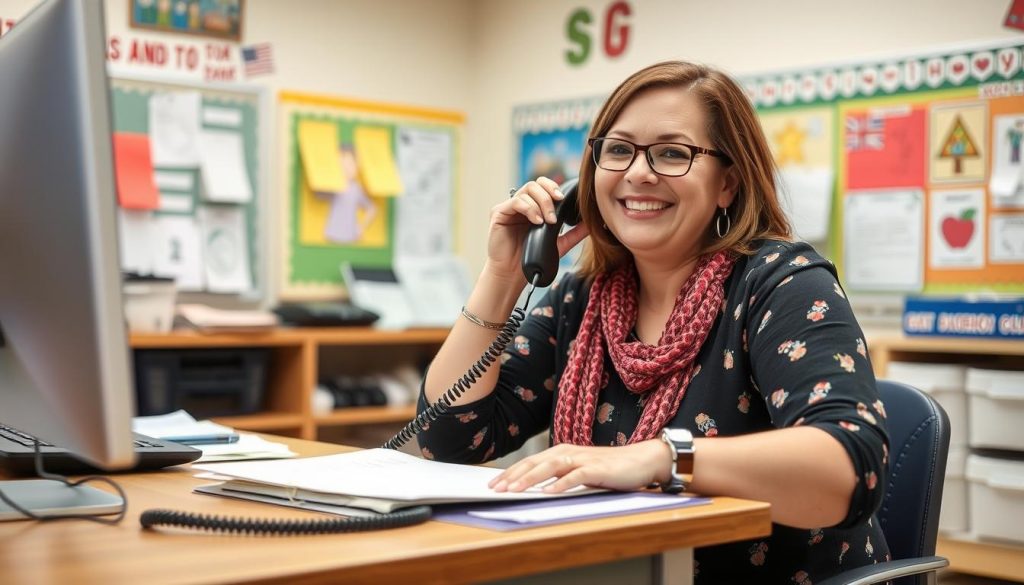
Start with Positive First Contact
Begin the year with positive communication to establish a constructive relationship foundation. These expert communication strategies set a collaborative tone:
- Send welcome emails or postcards introducing yourself before school starts
- Make brief “happy calls” during the first weeks to share something positive about each student
- Host informal meet-and-greet opportunities that feel less intimidating than formal conferences
- Create a classroom website or newsletter highlighting learning goals and celebrations
This positive first impression creates goodwill that supports more difficult conversations if they become necessary later.
Maintain Regular Communication Rhythms
Consistent communication patterns help parents know what to expect and demonstrate your organizational teacher skills. Consider establishing:
Weekly Updates
Brief newsletters or digital posts sharing learning highlights and upcoming topics
Monthly Check-ins
Personalized notes or quick calls to share student progress and strengths
Quarterly Showcases
Digital portfolios or in-person events highlighting student growth
Periodic Surveys
Brief questionnaires seeking parent input on classroom activities or communication preferences
Address Small Concerns Before They Grow
Early intervention is an expert communication strategy that prevents minor issues from escalating. When you notice emerging concerns:
- Reach out promptly with a neutral, solution-focused approach
- Frame the conversation around supporting the student rather than placing blame
- Offer specific observations and ask for parent insights
- Propose a collaborative plan with clear next steps
“An ounce of prevention is worth a pound of cure.” This adage applies perfectly to parent communication—addressing small issues early prevents much larger problems later.
Create Feedback Loops
Inviting parent input demonstrates that you value their perspective—a powerful teacher skill for building trust. Consider these approaches:
- Send brief surveys about communication preferences or specific classroom topics
- Provide multiple channels for parents to share questions or concerns
- Ask specific questions during interactions to elicit parent insights
- Follow up after implementing parent suggestions to close the feedback loop
Proactive Communication Tip: Create a simple tracking system to ensure you’re reaching all families with positive communication. A quick spreadsheet can help you monitor which families you’ve connected with and which might need additional outreach.
By implementing these proactive expert communication strategies, you demonstrate essential teacher skills that build strong foundations with families. This investment in regular, positive communication creates a reservoir of goodwill that supports your relationships through any challenges that arise.
Develop Your Parent Communication Toolkit
Ready to enhance your teacher skills with proven communication templates and strategies? Our specialized course provides practical tools for building stronger parent partnerships.
Building Lasting Trust Through Expert Communication
Effective parent communication isn’t just a nice-to-have skill—it’s an essential component of student success. By implementing the expert communication strategies we’ve explored, you demonstrate professional teacher skills that create strong, collaborative partnerships with families.
Remember that building trust is an ongoing process that requires consistency, empathy, and intentionality. Each positive interaction creates a foundation for the next, gradually building relationships that support your students’ growth and learning.
As you implement these approaches, be patient with yourself. Like any teacher skill, effective communication develops with practice and reflection. Start by selecting one or two strategies that resonate with your current needs, implement them consistently, and then gradually expand your communication toolkit.
The investment you make in developing these expert communication strategies will pay dividends throughout your teaching career—creating more positive classroom environments, reducing stress, and ultimately helping your students thrive through strong school-home partnerships.
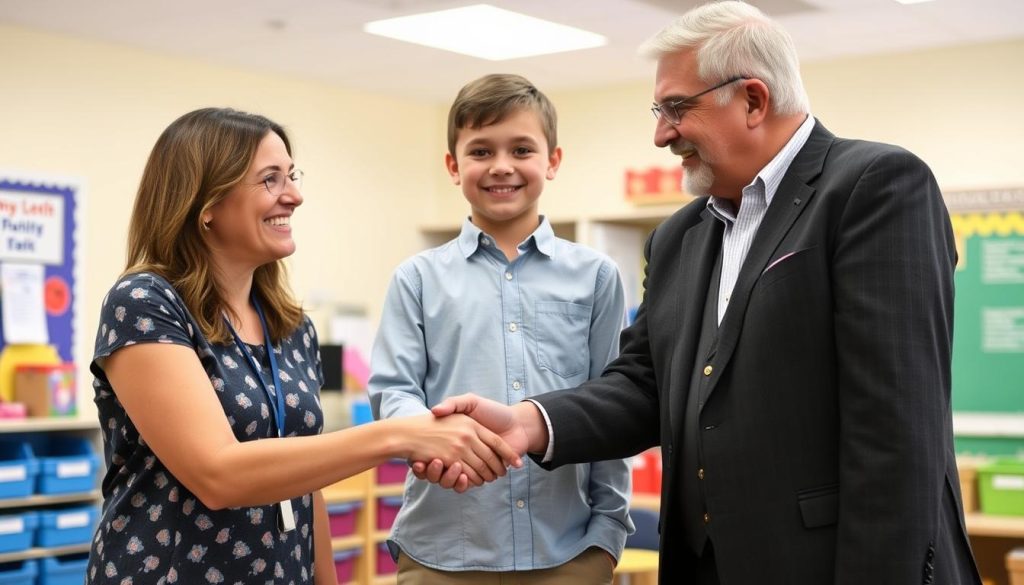
Strong teacher-parent partnerships create the foundation for student success
Continue Developing Your Communication Skills
Ready to take your parent communication to the next level? Explore our comprehensive resources designed specifically for K12 teachers looking to enhance their professional skills.

